Many Recommendations of the Season
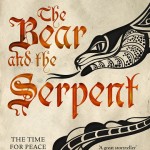 So I am the bear who walks into a bar, which is to say, apologies for the long pause. Mostly I have been finishing off the first draft of the Hyena and the Hawk*, book 3 of Echoes of the Fall (book 2 of which, The Bear and the Serpent, is coming out in February. Also I have been playing Warcraft, so there's that.
So I am the bear who walks into a bar, which is to say, apologies for the long pause. Mostly I have been finishing off the first draft of the Hyena and the Hawk*, book 3 of Echoes of the Fall (book 2 of which, The Bear and the Serpent, is coming out in February. Also I have been playing Warcraft, so there's that.
I wanted to bung a few books at you in case you were looking for some late festive gifts — these are just books I've read in the last few months and greatly enjoyed, and which deserve to be enjoyed by a wide audience.
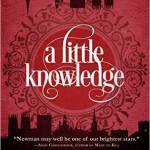 I'm going to start with a continuation of a favourite series, in A Little Knowledge, book 4 of Emma Newman's Split Worlds series. The series as a whole is absolutely cracking, but has been on hiatus for a while and is now back on the road, and with some spiffy new covers as well. For those who don't know it, the series is an urban/portal fantasy where a society of people live in the Nether, a magical world alongside our own that resembles Georgian England and is run by families under the patronage of cruel and arbitrary faerie lords. There are also a number of other factions and powers, but the main thrust of the book is the struggle of the heroine to break out of the restrictive and unfair society of the Nether, and then, when she does take a part in it, to fight for its reform. The odds stacked against her and the other characters are immense, and never more so than in this volume, where the sheer weight of all that oppressive tradition constantly seems to be on the point of stamping out her hopes and dreams. This is a society that perpetuates itself generation after generation, and Emma shows precisely how even its oppressors are its victims, too scared to speak out, isolated from support and forced into their roles by the expectations of those around them.
I'm going to start with a continuation of a favourite series, in A Little Knowledge, book 4 of Emma Newman's Split Worlds series. The series as a whole is absolutely cracking, but has been on hiatus for a while and is now back on the road, and with some spiffy new covers as well. For those who don't know it, the series is an urban/portal fantasy where a society of people live in the Nether, a magical world alongside our own that resembles Georgian England and is run by families under the patronage of cruel and arbitrary faerie lords. There are also a number of other factions and powers, but the main thrust of the book is the struggle of the heroine to break out of the restrictive and unfair society of the Nether, and then, when she does take a part in it, to fight for its reform. The odds stacked against her and the other characters are immense, and never more so than in this volume, where the sheer weight of all that oppressive tradition constantly seems to be on the point of stamping out her hopes and dreams. This is a society that perpetuates itself generation after generation, and Emma shows precisely how even its oppressors are its victims, too scared to speak out, isolated from support and forced into their roles by the expectations of those around them.
 Next up, a handful more of Tor novellas, which have been an excellent line all round. I really enjoyed Seanan McGuire's Every Heart a Doorway (which I read long enough ago that I really should have written about it before now) — set in a school for children who have been through portals into magical worlds and then been forced back into our own rather unsatisfactory one.
Next up, a handful more of Tor novellas, which have been an excellent line all round. I really enjoyed Seanan McGuire's Every Heart a Doorway (which I read long enough ago that I really should have written about it before now) — set in a school for children who have been through portals into magical worlds and then been forced back into our own rather unsatisfactory one.  It's a book about displacement and not fitting in, as expressed both in the places the characters want to return to, and their own diverse natures. It's also a bit of a heartbreaker. After that we have Laurie Penny's Everything Belongs to the Future - I know Laurie as a writer of social commentary (her Unspeakable Things is a very thought-provoking piece about misogyny and social expectation) and Everything is a hard-hitting piece of future-punk in a society where the rich can buy long life.
It's a book about displacement and not fitting in, as expressed both in the places the characters want to return to, and their own diverse natures. It's also a bit of a heartbreaker. After that we have Laurie Penny's Everything Belongs to the Future - I know Laurie as a writer of social commentary (her Unspeakable Things is a very thought-provoking piece about misogyny and social expectation) and Everything is a hard-hitting piece of future-punk in a society where the rich can buy long life. 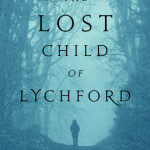 And yes, that topic is a common SF trope, and yet Penny gives us a real razor's edge ride through the worlds of rich and poor with a very clear eye as to how things would work, and what would fall apart. One of the first things I remember stopping at was that suddenly every government was all about saving the environment and renewable power, because those holding the reins realised they would be around to see the results of not sorting things out. Finally, I will put in a word for The Lost Child of Lychford, Paul Cornell's sequel to The Witches of Lychford, which pits the three heroines of the latter against a new and particularly insidious supernatural threat — Witches was on every novella shortlist in 2016, and this is another great offering.
And yes, that topic is a common SF trope, and yet Penny gives us a real razor's edge ride through the worlds of rich and poor with a very clear eye as to how things would work, and what would fall apart. One of the first things I remember stopping at was that suddenly every government was all about saving the environment and renewable power, because those holding the reins realised they would be around to see the results of not sorting things out. Finally, I will put in a word for The Lost Child of Lychford, Paul Cornell's sequel to The Witches of Lychford, which pits the three heroines of the latter against a new and particularly insidious supernatural threat — Witches was on every novella shortlist in 2016, and this is another great offering.
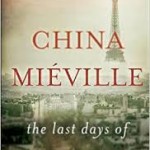 China Mieville's Last Days of New Paris is next: a remarkable novella presenting itself as a piecemeal account of a sideways occupied Paris where Nazi sorcerers and their unwilling demon slaves battle magical surrealists in a landscape haunted by surrealist art come to life in a variety of disturbing and life-threatening ways. It's a weird, twisty narrative of heroism, duplicity and wheels within wheels, and if (like me) you're not up on the art, there are notes at the back.
China Mieville's Last Days of New Paris is next: a remarkable novella presenting itself as a piecemeal account of a sideways occupied Paris where Nazi sorcerers and their unwilling demon slaves battle magical surrealists in a landscape haunted by surrealist art come to life in a variety of disturbing and life-threatening ways. It's a weird, twisty narrative of heroism, duplicity and wheels within wheels, and if (like me) you're not up on the art, there are notes at the back.
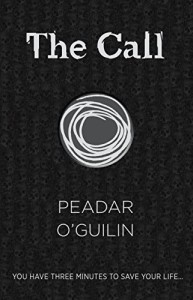 Another writer I've praised in the past is the very fine Mr Peadar Ó Guilín. Last year at a convention I had the pleasure of hearing him read from his work in progress, and since then I have been eagerly awaiting the finished work, which is now here in the form of The Call, a very nice (which is to say exceptionally nasty) YA horror novel. Basically, back in the mists of Irish myth, the incoming ancestors of the modern day Irish made a deal with the Sidhe to split the land 50/50, except they pulled a fast one and condemned the Sidhe to the half of the land below the ground. Now the faerie chickens are coming home to roost because Ireland has been sealed off from the world and its children are being taken one by one — only for a few minutes, except that few minutes is a whole day in the faerie realm, where the Sidhe will hunt them through a nightmare landscape until the day is up or — more likely — until they're caught to be horribly tortured and changed. Now Ireland is devoted to trying to train and prepare its youth for their inevitable moment of testing. Which sounds bad enough until you find the heroine has had polio and can barely walk unassisted, let alone run… It's a brilliant, gripping book, well worth the wait.
Another writer I've praised in the past is the very fine Mr Peadar Ó Guilín. Last year at a convention I had the pleasure of hearing him read from his work in progress, and since then I have been eagerly awaiting the finished work, which is now here in the form of The Call, a very nice (which is to say exceptionally nasty) YA horror novel. Basically, back in the mists of Irish myth, the incoming ancestors of the modern day Irish made a deal with the Sidhe to split the land 50/50, except they pulled a fast one and condemned the Sidhe to the half of the land below the ground. Now the faerie chickens are coming home to roost because Ireland has been sealed off from the world and its children are being taken one by one — only for a few minutes, except that few minutes is a whole day in the faerie realm, where the Sidhe will hunt them through a nightmare landscape until the day is up or — more likely — until they're caught to be horribly tortured and changed. Now Ireland is devoted to trying to train and prepare its youth for their inevitable moment of testing. Which sounds bad enough until you find the heroine has had polio and can barely walk unassisted, let alone run… It's a brilliant, gripping book, well worth the wait.
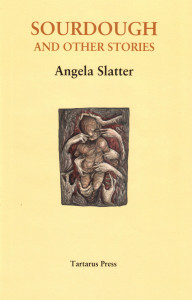 For the next recommendation I have to thank the podcast The Writer and the Critic, which is an incisive, if sometimes brutal, book review show by Kirsten McDermott and Ian Mond which gives genre fiction a thorough going-over. From their recommendation I picked up Sourdough and The Bitterwood Bible by Angela Slatter, two collections of linked short stories (or are the "mosaic novels"?) set in a fairy tale world and focusing on the sort of people fairy tales don't generally cover. I say "fairy tale" advisedly, because that's very much the feel — not specific tales from Grimm or Anderson, but a world full of little magics, where anyone can have a special talent, or encounter something strange. The writing is gorgeous, the sort of elegant, lush prose where every word has plainly been chosen with exquisite care. The stories stand alone, but as you read, you pick up recurring threads and characters so that an over-story is there to be pieced together. Bitterwood is something of a prequel to the earlier-written Sourdough and relies more on connections between the stories.
For the next recommendation I have to thank the podcast The Writer and the Critic, which is an incisive, if sometimes brutal, book review show by Kirsten McDermott and Ian Mond which gives genre fiction a thorough going-over. From their recommendation I picked up Sourdough and The Bitterwood Bible by Angela Slatter, two collections of linked short stories (or are the "mosaic novels"?) set in a fairy tale world and focusing on the sort of people fairy tales don't generally cover. I say "fairy tale" advisedly, because that's very much the feel — not specific tales from Grimm or Anderson, but a world full of little magics, where anyone can have a special talent, or encounter something strange. The writing is gorgeous, the sort of elegant, lush prose where every word has plainly been chosen with exquisite care. The stories stand alone, but as you read, you pick up recurring threads and characters so that an over-story is there to be pieced together. Bitterwood is something of a prequel to the earlier-written Sourdough and relies more on connections between the stories.
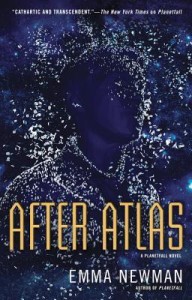 Finally, I will bring this full circle by taking up the cause of After Atlas by, again, Emma Newman. I loved last year's Planetfall, in which Emma debuted as an author of very intelligent SF as well as exceptional fantasy. Atlas is a semi-sequel — taking place in the same world and springing from the same source events as the earlier book, though readable on its own. It is a cyberpunk detective story set in a grim future of deprivation and corporate intrusion, and also one of the best visualisations of how a future information technology will inform how people talk to each other, and how a murder, for example, might be investigated. The hero is a kind of force-grown cyber-detective all but owned by the state, who was formerly a member of the cult that launched the colony ship Atlas (which gave rise to the colony in Planetfall). Now the head of that cult's earthbound remainder has been murdered, and he is the only man trusted by all sides to investigate. Atlas is extremely dark, and gives a view of the near-future that is horribly plausible.
Finally, I will bring this full circle by taking up the cause of After Atlas by, again, Emma Newman. I loved last year's Planetfall, in which Emma debuted as an author of very intelligent SF as well as exceptional fantasy. Atlas is a semi-sequel — taking place in the same world and springing from the same source events as the earlier book, though readable on its own. It is a cyberpunk detective story set in a grim future of deprivation and corporate intrusion, and also one of the best visualisations of how a future information technology will inform how people talk to each other, and how a murder, for example, might be investigated. The hero is a kind of force-grown cyber-detective all but owned by the state, who was formerly a member of the cult that launched the colony ship Atlas (which gave rise to the colony in Planetfall). Now the head of that cult's earthbound remainder has been murdered, and he is the only man trusted by all sides to investigate. Atlas is extremely dark, and gives a view of the near-future that is horribly plausible.
That's all for now. I am going to try my damndest to get at least one more post out before the end of the year, if only to blow my own trumpet a bit. I have a lot I would like to talk about, but most of it is fussing about the contract stage, and so must remain locked in its hamper for now.
*Titles may be substituted with one of equal or greater value.
 © 2008-2025 Pan Macmillan
© 2008-2025 Pan Macmillan